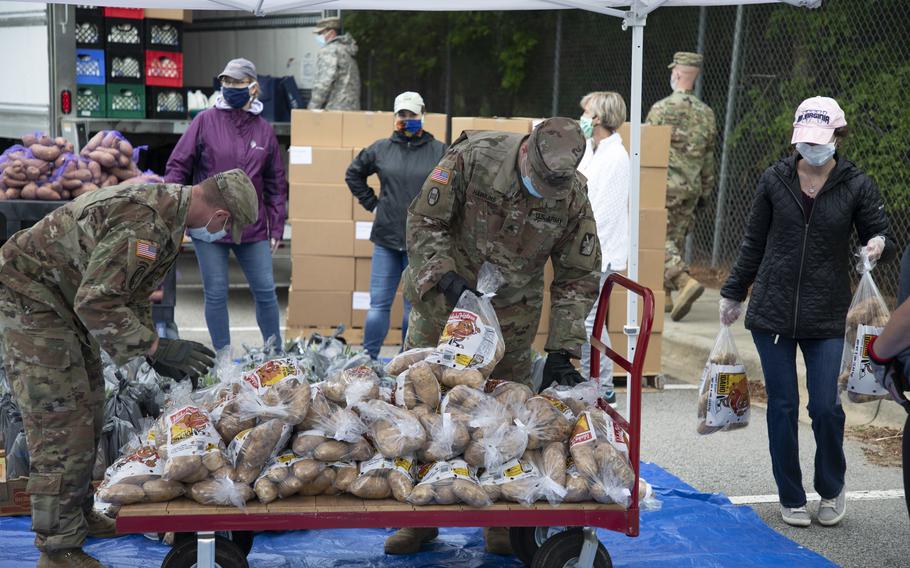
North Carolina Army National Guard soldiers and other volunteers stack bags of potatoes that were being distributed to veterans and military families in May 2020. (Mary Junell/U.S. Army)
There’s a reason the military has a recruiting and retention crisis: The work is tough, the pay is lousy, and there’s that pesky possibility of getting shot. But also, as the National Defense Committee unfortunately must point out every day across a broad variety of military and veteran benefits, our government simply does not trust the military to make even the simplest of choices for themselves, and “infantilizes” them with a pervasive attitude of condescending paternalism.
The National Defense Committee commits itself to defend military and veteran civil and legal rights. This should not be necessary, but while our government trusts military personnel with the lives of our sons and daughters, it does not trust them to choose how to balance their checkbook, where to use their earned educational benefits, or, in one of the most inane examples of that condescending paternalism, to choose whether to buy a soda at the local store.
I kid you not. This is a serious proposal from some government leaders, but a stupid one at that.
Such governmental paternalism isn’t unique. As we wrote last November regarding military educational benefits, “The government doesn’t tell me I can only spend my military retirement at the base exchange and the commissary — I’m free to shop at Target and Costco if I want. So why should the government restrict veterans’ educational benefits in that same way?” Little did we know at the time that if we’re a poor veteran, the government does, in fact, want to stop us from buying a chocolate bar.
Again, we are not joking.
In fact, last May, Sen. Marco Rubio of Florida (whose state, by the way, produces 55% of all the sugar produced in the United States) introduced S. 1485, The Healthy SNAP Act of 2023, where he stands alone on this bill as none of his Senate colleagues have cosponsored the legislation. Other senators probably see something Rubio ignores — the issue is a loser and will do nothing to reduce American obesity or improve military readiness.
SNAP stands for the Supplemental Nutrition Assistance Program, which many people know simply as “food stamps.” But what many likely do not know is about 128,000 active-duty military families experience “very low food security,” meaning they skipped and downsized their meals, ate less than they thought they should, and could not afford to eat balanced meals. That represents 10% of the active-duty military force, and the deputy assistant secretary of defense for military community and family policy said such food insecurity is a “readiness [and] national security issue.”
But Rubio, without citing any statistical or economic proof, claims the 40% obesity rate in the United States is because the SNAP program allows recipients to buy foods with added salt and sugar. Citing an 8-year-old Department of Agriculture study, which was itself based upon 2011 food purchasing data, Rubio proclaimed more than 20% of all SNAP spending goes to unhealthy food and drink.
But what Rubio forgot to divulge is that same 13-year-old data showed food buying patterns between SNAP-using households and non-SNAP households was almost identical — leading the report’s primary finding to be that, “There were no major differences in the expenditure patterns of SNAP and non-SNAP households, no matter how the data were categorized” and that, “Less healthy food items were common purchases for both SNAP and non-SNAP households.” But heaven forbid such inconvenient truths get in the way of a story too shocking to be true.
Because, in fact, it is not.
The Healthy SNAP Act is a bad idea that only hurts military and veteran families it mistakenly claims it is trying to protect. The real issue is the number of military families and veterans forced to use food stamps because Congress pays our military and an additional 1.2 million veterans such a pittance for their service, current and past, that they cannot feed their families without assistance through SNAP. Congress would far better serve military and veteran families (including 107,000 Florida veterans on food stamps) by raising military pay and veterans disability benefits so that they can provide for their families befitting of the service and sacrifice they make to protect our freedom.
Bob Carey is director of the National Defense Committee, and previously served as national security adviser to two U.S. senators and a Senior Executive Service member in the Department of Defense. He is a retired U.S. Navy captain.